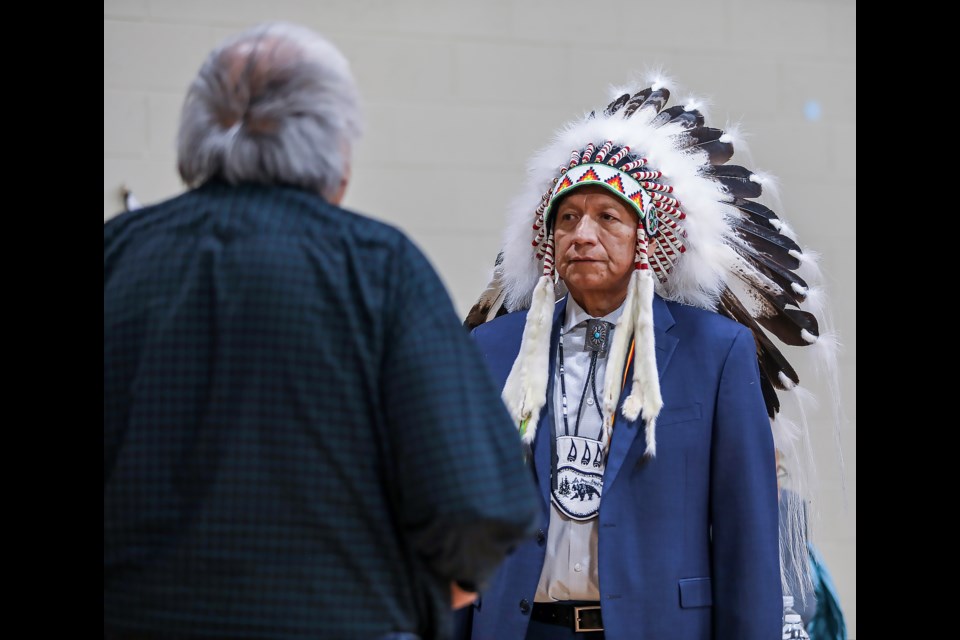STONEY NAKODA – Bearspaw First Nation is standing up to Alberta’s premier over “serious concerns” with the province’s sovereignty act.
Chief Darcy Dixon is one of the latest Indigenous leaders in the province to lend his voice to a growing list of First Nations in opposition to the legislation, passed as the Alberta Sovereignty Within a United Canada Act by Premier Danielle Smith’s UCP government on Dec. 8.
“As Premier of Alberta, you never consulted with us. In fact, you made a unilateral decision not to consult with us in relation to arguably the most important and impactful legislation in the history of Alberta,” Dixon wrote in a letter to Smith on Friday (Dec. 16).
“This was done notwithstanding the clear decisions of the Supreme Court of Canada on the positive and mandatory duty to consult with Indigenous peoples.”
Dixon, who was also present at a press conference in Edmonton last month where treaty chiefs came together to oppose the act – then a proposal, now a law – argued the legislation threatens treaty rights developed in conjunction with the Crown.
The chief cited Section 35 (1) of the 1982 Constitution Act which recognizes and affirms the existing Aboriginal and treaty rights of the Aboriginal peoples in Canada, also signed by the Crown, as the treaties were.
“We have lived in this place now named Alberta for thousands of years,” Dixon wrote. “Chief Jacob Bearspaw, on behalf of the Bearspaw First Nation and its members, was a signatory to Treaty No. 7, made and concluded in September of 1877, with Her most gracious Majesty The Queen of Great Britain and Ireland.”
The letter requests the UCP government immediately withdraw the act so that it does not receive Royal Assent from the Lt. Governor General on behalf of the Crown, thereby passing the bill to make it law.
However, Lt.-Gov. Salma Lakhani had already signed the act Dec. 15, when it officially took effect.
A week earlier, an emergency resolution at the Assembly of First Nations was developed to challenge Alberta’s sovereignty act and a Saskatchewan sovereignty bill, which the resolution stated, “abrogate and negate First Nations’ sovereignty.”
In an interview, Bearspaw CEO Robb Shotclose called Alberta’s act unconstitutional. He said there has been no engagement throughout the legislation process from the province with Bearspaw First Nation or the greater Stoney Nakoda First Nation, also including Chiniki and Goodstoney First Nations.
“This has been coming down the pipe pretty quickly from the Government of Alberta and I think there’s been more discussion at the treaty level and chiefs’ associations,” he said. “But we haven’t had that opportunity to speak with the province and we haven’t yet gathered as Stoney Tribal Council and administration to speak about it together.”
Goodstoney and Chiniki First Nations were copied on the letter, though Shotclose said he could not comment on whether they shared the same stance as Bearspaw regarding the act.
“Bearspaw First Nation is a Treaty 7 signatory, so we feel like it’s our right to have our own position and stand on our own issues,” he said.
“This letter acts as a paper trail of where we stand on this.”
In an email to the Outlook, Callum Reid, the press secretary for the Ministry of Indigenous Relations, said the UCP government’s approach to reconciliation includes “economic reconciliation, and working together on major projects going across our province and our country to further strengthen our relationship.”
“We understand that there are chiefs that have expressed concern for Bill 1,” Reid said in the email. “Since then, our government has reached out to arrange meetings and we’re looking forward to discussing these issues.”
During the time Treaty 6, 7 and 8 were signed, the province of Alberta did not exist. It did not officially become a province until September 1905, creating a potential trigger for jurisdictional disputes with the sovereignty act.
On Monday, Onion Lake Cree Nation, which straddles the border of Alberta and Saskatchewan in Treaty 6, announced it was suing the Alberta government over a lack of consultation taken in the act's legislative process and infringement of treaty rights.
With the number of Indigenous voices dissenting against the act growing longer and louder by the day, Dixon said he hopes to see meaningful discussions start to take place between Smith and the UCP government, including with Bearspaw First Nation.
“We will be looking for a process that will respect the rights of First Nations and acknowledges our distinctive and important status within the constitutional framework of Canada,” the chief wrote.
“We will defend ourselves accordingly and in the name of our Nation members, past, present and future.”
The Local Journalism Initiative is funded by the Government of Canada. The position covers Îyârhe (Stoney) Nakoda First Nation and Kananaskis Country.




